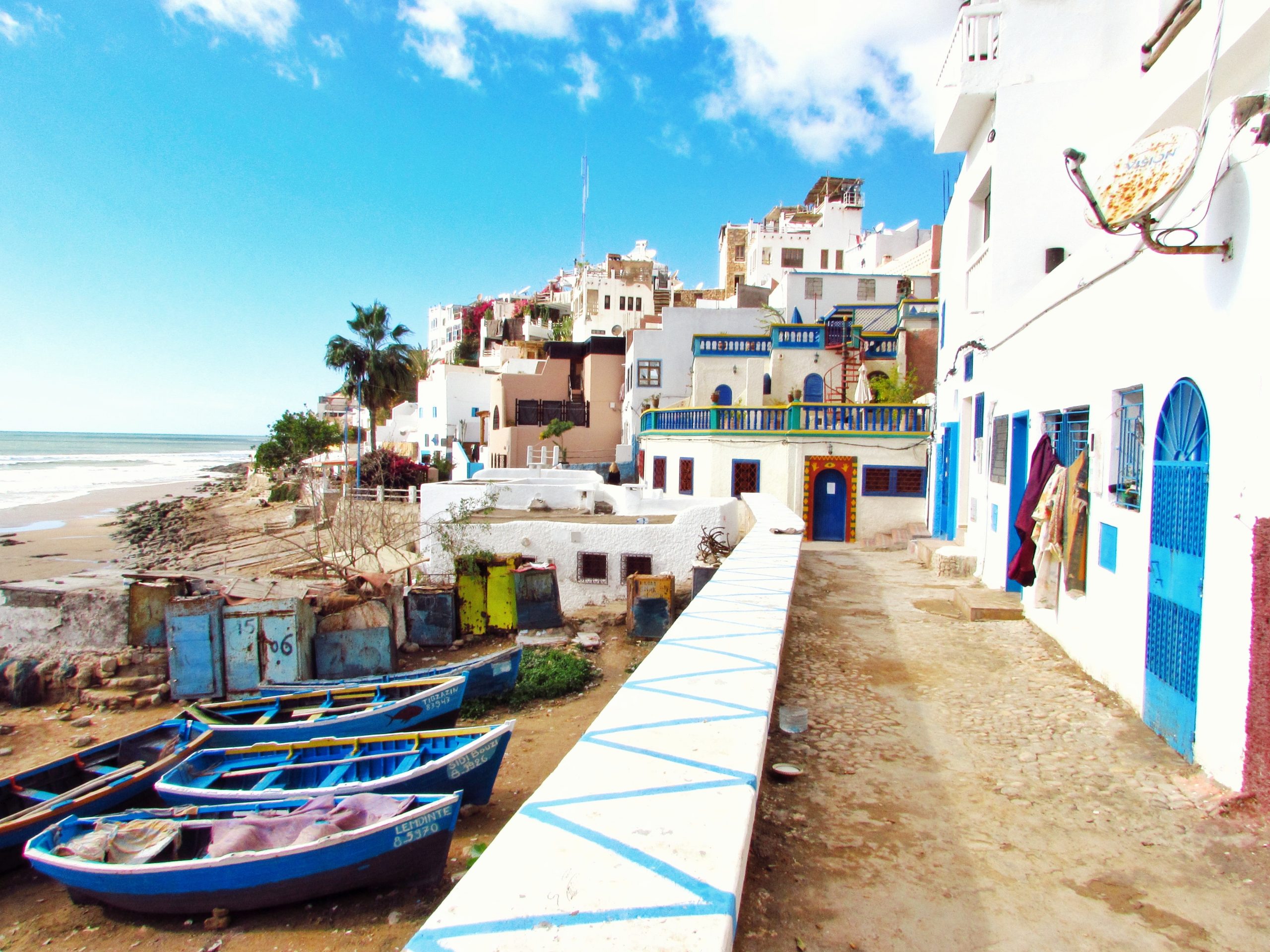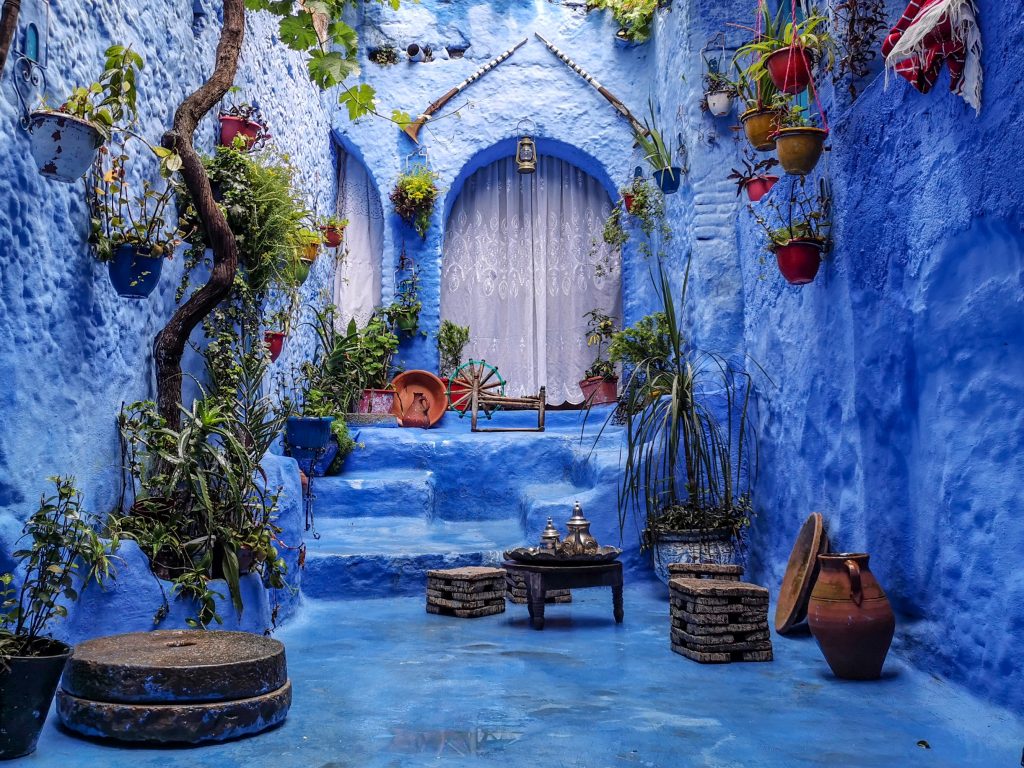Morocco is a North African country known for its vibrant culture, historic cities, stunning landscapes that range from the Sahara Desert to the Atlas Mountains, and bustling markets, offering a unique blend of Arab, Berber, and European influences.
Landscape
The landscape of Morocco is split between mountainous ranges that gradually taper into vast plains and plateaus. The southern end borders the Sahara; the world’s largest and most arid desert. Where the dunes and the unique Berber lifestyle is ripe for discovery.
The stars of Morocco’s diverse scenery are the incredible Atlas Mountains. With Jebel Toubkal being the highest peak at 4,165 m. Outdoor adventurers will find endless pleasure in hiking, horse riding, mountain biking, and the chance to see some rare wildlife.
Morocco’s four Imperial cities are Marrakesh, Fes, Meknes, and Rabat. Marrakesh is the most famous. With its meandering Old Medina and endless souks where getting lost is half the fun. The coasts of Morocco shouldn’t be overlooked. The azure waters of Agadir are a relaxing haven and Essaouria is fantastic for water sports.
Gastronomy
The gastronomic scene in Morocco is sensational. It’s rich, varied, and intrinsically delicious. The countries national dish is the tagine. A traditional Moroccan stew featuring meat (mainly lamb), potatoes, peas, beans and varying spices cooked in a clay pot. Spices feature heavily in Moroccan food, and bread practically replaces cutlery here. Used to mop up all those tastebud tingling sauces. Try as many as you can, khobz and msemen flatbreads, and baghrir pancakes are the tip of the iceberg. In Morocco, some of the best food around hails from street vendors. So don’t be shy as you pass these simple carts. Follow the locals to find the best haunts. It’s fresh, filling, and ultimately the cheapest and most authentic way to taste your way around Morocco.
Culture
Morocco has a diverse mix of cultural influence. From the Arabs and Berbers to the many varied backgrounds. Tangier has a large influx of expatriates that have settled in the country for decades. The city is revered for the peaceful way of life and cosmopolitan café culture. Where you can socialize and drink sweet mint tea until the early hours. Across the country, rich diversity can be seen in everything from the architecture to the food. Moroccans are well known for their welcoming hospitality and warm nature that will make you feel at home among the hustle and bustle of vibrant city life.
Shopping in Morocco
Morocco is famous for its many souks and marketplaces. Squares filled with alleyways that lead to glorious treasures and beautiful merchandise. Crafting here is big business. Have fun haggling for deals over intricate woven rugs and scarves, delicate metal jewellery and ornaments. Along with endless mounds of colourful and divine scented herbs, spices, and oils.
Know Before You Go
Trains are the best way to get around this majestic wonderland. They’re cheap, reliable, and comfortable. You can simply buy tickets at the station and hop aboard. It’s usually worth paying a little extra for a first-class ticket for the reserved seating and air-con.
Moroccan’s are some of the warmest and hospitable people around. Though you’ll still come across your fair share of scammers in certain parts of the city. Take extra care when wandering the medina or shopping in the souks. Touts know they can take advantage of a tourist if you’re not paying attention. Always agree on a price before getting a henna tattoo or following some random on a wild goose chase for the perfect Moroccan hammam. If you’re feeling harassed, fire off a solid ‘la’ (no in Arabic) and they’ll usually get the message.
Colours, textures, shapes. You’ll see them everywhere in Morocco, from the intricate mosaic tiling to the structure of a building, to the piles of spices in the souks. Every corner is a photo opportunity, every door is instagrammable. Take the day to get lost in the beauty of Morocco, and it will be a day you and your camera won’t forget.
Best Time To Visit
Some places are a delight all year round, such as the coastal regions or the awe-inspiring Atlas mountains. Though, the nicest conditions are from April to October. The best time to visit the inland and cities of Morocco is in Spring, (March to May) or autumn (September to October). You get the best of both worlds. Avoiding the sweltering heat of summer and the blistering cold of winter, with clear, sunny days.
October is the best all-rounder and the perfect temperature to explore the cities in comfort. The hiking conditions in the mountains are ideal, and the desert region is most vibrant.
It’s best to avoid visiting during Ramadan. Businesses are sometimes closed, and the transport network is disrupted.
What To Expect
Planning a whirlwind trip around Morocco? Here are our top tips.
Currency – The official currency is the Moroccan Dirham. Be sure to carry cash with you in Morocco as most places accept cash only. Especially the souks and marketplaces.
Language – The official language is Arabic with the Moroccan dialect, Darija. You’ll also find Berber, French, and Spanish in the North.
ATMs – ATM’s are easily found in cities and towns, but rare in the outer regions. It’s best to keep a good amount of cash on you, as cards are rarely accepted and some ATM’s may run out after a busy period.
Plugs – Morocco uses the Europlug, or Type C style plug with 2 round pins. As well as the Type E plug with 2 round pins and a hole for the earth pin. The standard voltage is 220v and 50Hz frequency.
Safety – Morocco is regarded as safe to travel and has a low crime rate. The souks can get a little hectic with touts and hagglers, so always take extra care in crowded areas.
Climate – Morocco has a subtropical climate, meaning long, hot summers, and extreme winters. More prevalent in the desert plains.
Summers reach temperatures up to 28 degrees in the Northern cities such as Tangier. That can top out at a blistering 36 degrees in Marrakesh and the southern regions.
If you’re travelling to see the dunes in the Sahara. Prepare for some very hot days and freezing nights in desert country. If you’re heading out on a day trip to the mountains, pack a light jacket for the cooler air.

